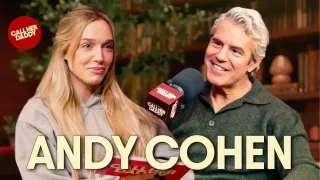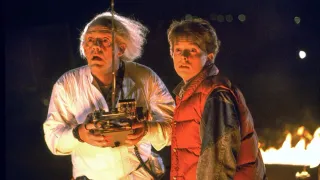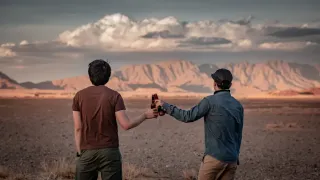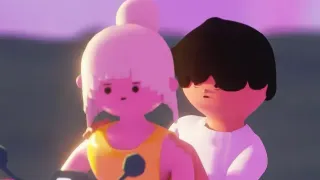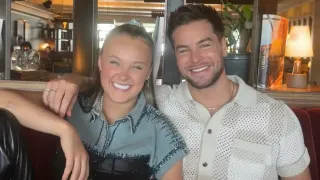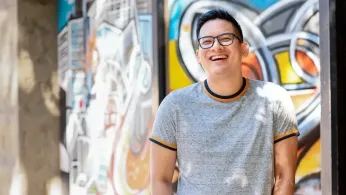
5 hours ago
EDGE Interview: With ‘Lizard Boy,’ Justin Huertas Crafts a Queer, Musical, Comic-Book World Where Everyone Can Be a Hero
Steve Duffy READ TIME: 4 MIN.
Trevor has become a myth in his hometown: a lonesome outsider whose skin turned green and scaly after a childhood encounter with a dragon. Now he leaves his house only once a year, on Monsterfest, the anniversary of the incident—and that’s tonight. Out on a first date with a new crush, Cary, he meets a fellow dragon survivor who fears the dragons have returned and begs Trevor to help fight them. Can Trevor accept who he is and save his city … and his first date?
As dragons, love, and identity collide onstage, Lizard Boy soars beyond the boundaries of a typical comic book musical. Justin Huertas shared how this singular story took flight.
EDGE: What inspired you to write Lizard Boy?
JH: I grew up with superheroes, comic book superheroes, and cartoons on TV. I loved the Teenage Mutant Ninja Turtles and the Power Rangers. Ever since I was a child, I wanted to be a superhero. Once I got this commission at the Seattle Repertory Theatre, the only requirement was that I play the cello; otherwise, I could do whatever I wanted. I gave them some ideas, and this show was one that the then-artistic director, Jerry Manning, liked. Trevor was the character, and his story, he gravitated towards the most. I was very surprised by that. I was invited to his office for a meeting, and then, out of the blue, he poured the first hundred issues of Fantastic Four onto his desk and told me he was a comic book nerd, too. It was definitely with his encouragement that I dove into this crazy genre, and my goal was to write something where I get to be a superhero. I didn't really know at the time how I would approach that or where it would go, or who this character was, until it became very clear that I was writing my own experiences into Trevor. I've always wanted to be a superhero and never thought I'd get the chance.
EDGE: How does each of the characters represent different facets of your personality?
JH: There's a lot of me in all of them. Trevor is the most direct because that is the character that I played. I've had the original cast of Lizard Boy, William A. Williams, and Kiki deLohr have been a part of it from the beginning. When I was writing, I wrote to their voices and their sensibilities. A lot of their sense of humor made it into those characters, but it was important for me to figure out how I related to them. This was the first musical I ever wrote, and I didn't really know anything about writing a musical and balancing even just three characters. How do you give each of them their own space and their own moments? In the first version, Trevor was a very complex character, and Siren and Cary were very two-dimensional. Cary was the love interest who got kidnapped, and his only purpose was to just be in peril and also be hot. Siren was a clean-cut villain. Her original goal, in the very first versions, was to become the Queen of the Dragons, and when they returned, she would rule over them and then rule the world. It took a while for me to figure out how to deepen these characters into people who I, myself, would relate to a lot, and once I did, it's as much me as it is William and Kiki. After that, it felt so much more fulfilling to me that it's about three people, and not just about one.
EDGE: You not only wrote the script, but you wrote the music. Talk about your process.
JH: When we started this process, I was a very new writer and a new songwriter. What I did with songs was write them for myself and kept them secret. I thought they were cool and that no one would ever hear them. When we decided this idea might be a musical, Jerry Manning at Seattle Rep told me to start thinking about the kinds of songs I wanted in the show so we could start licensing them. I was really terrified to share my songs with him, but I shared two songs that no one else had ever heard. After he heard them, he said, “Okay, I guess you're writing the songs”. Through the process of writing this show, I also learned how to write songs for musical theater and balance them with my own pop sensibilities. I grew up with the catchiest melodies of the nineties and early two thousands, and the first couple of songs, like ‘The Woah Song’, went through a couple of little changes. And then ‘Another Part of Me,’ which is the song that Trevor has written that he wants to share with both characters in separate scenes. I learned a lot from the experiences of writing those songs and then orchestrating and arranging them. Everything was kind of orchestrated in a garage band kind of way. I would learn more and more as Kiki and William would contribute their own little ideas here and there. For example, William can beatbox, and we should use that. For the most part, the songs came from ideas and emotions. Sometimes I would know what this moment in the show needed to be, and then think, what are the words, and what am I trying to say? I would write down a bunch of words and then pick some that I connected with, while trying to figure out how to sing them. That's how a song began for me and a lot of the score.
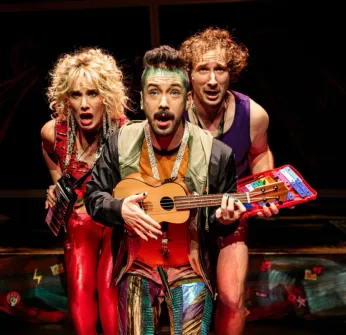
Source: Benjamin Rose Photography
EDGE: What’s the most rewarding part of seeing other performers inhabit roles you created?
JH: It's something that I never imagined would ever happen. We were writing it specifically for us and for who we are. We did think about what if we're the only ones who can do this, because that would be a bummer and not how we want the show to function. So, we thought, who else could do this? We were making it so specifically for ourselves that I would hate it if it only worked when we did it. I want it to work when anyone does it. My other thought was, will anyone even want to do it? The first time we licensed it to someone else was to the Know Theater in Cincinnati, Ohio, in 2022, and I was so nervous because I hoped it would be good. I was worried about whether I gave them enough information because the show means so much to me, and if I see something that wasn't quite right, I know I didn't give them enough information. I went and watched it, and it was completely different than how we had done it. It was their own production, their own cast, their own director, and it was magical. I cried all the way through. Their production was incredible. I never imagined that I'd get to see other people interpret my show in their own magical way
EDGE: Is this how you see Lizard Boy continuing to evolve through others performing their own interpretations?
JH: Yes, that's what I want. If it had been only us, it would never have worked. I have gotten into the habit of putting detailed stage directions into the script. It's a little cheat for us and it say to do this or that, but part of the joy of creating this script and score package for the Speakeasy in Boston, Nashville’s Street Theater Company in Nashville, and the Portland Center Stage is learning how other people interpret these moments and what they feel it needs, whether it’s the shape of a scene or how they pace it has been very exciting to watch. What I love about this show is that there isn't only one answer. I love it when it's wildly different than what I know it is.
EDGE: When Lizard Boy is made into a film, who are you casting?
JH: I am going to be a little selfish with my answer, but if Lizard Boy were made into a film, it would have to be animated, so I can play Trevor. Lizard Boy is such a special thing, and part of the reason why is that it is driven by actors who are musicians. It’s a three-person band. I am not sure how you would interpret that into a live-action film, but I feel like an animated film would work.
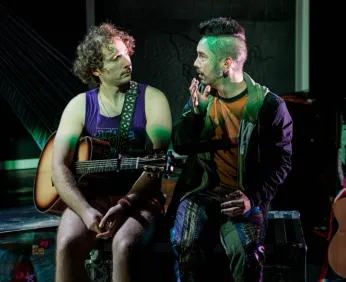
Source: Benjamin Rose Photography
EDGE: How did Grindr become part of the storyline?
JH: I was trying to think of something that made sense to me. The things I had decided were: Trevor's green skin, that he has trouble leaving his apartment because he's green, and that he only leaves a day a year because other people are in costume. That’s how ‘Monster Fest’ was invented. Then it made sense to me that he gets on Grindr, where he finds our next character, Cary. At the time I was writing this, dating apps were a big part of my life. I was 26 and obviously on Grindr. That afforded me a lot of fun little things to write into the storyline. Trevor and Cary have this cute meet, especially because one of them uses Grindr differently than the other.
EDGE: Tell us about your worst Grindr experience.
JH: I'm trying to think of my worst Grindr hookup that I actually want to share. There have been some bad ones. The most innocent thing I can share is that I met this sweet guy whose profile seemed super cool. When we meet, he's waiting for me to drive the conversation. We have dinner, and I am asking all the questions, and when he stops answering, I wait for him to ask some, but that didn't happen. After dinner, He was hoping something would happen, but He was bored, and I only wanted to do that with fun people.
EDGE: How do you hope Lizard Boy will help people who feel othered?
JH: The thing that I needed when I was a kid was to be able to see myself save the world. I placed myself among all these superheroes that I loved. Spider-Man wears a mask, so you don't see his face while he's saving the world, so that could be me. The same goes for the Power Rangers: they wear suits and helmets, and you can't see them, and that could be me, too. For any superheroes whose face or skin you saw, I never saw anyone who looked like me. I didn't realize how much I needed that until much later in life. This show is for someone who looks like me, someone who is also queer, Filipino, Asian, a person of color, or weird. Even if there's anything about them that they feel like I am not what the world wants. I want them to know that they are worthy of a story as grand as saving the world from an apocalypse. I hope young people see it and see themselves. What I love about the show — and what I have learned over the years — is that many young trans people see it and relate to it. It never even occurred to me that Trevor’s experience could be translated so well into what some of these young folks are going through. The decisions I made for the show seemed the most logical to me, like Trevor's name. He wants to go by a name that feels more closely aligned with who he is, rather than the one someone is trying to impose on him. I think what's most meaningful to me is when people share aspects of my identity, but people who don't. People are the most different from me you can get, and if they can come see the show, they'll feel like it's them with the green lizard skin saving the world. That's what I want. We all have the power to save the world and ourselves.
'Lizard Boy' is now playing in Boston at SpeakEasy Stage Company
https://speakeasystage.com/
https://www.lizardmusical.com/
